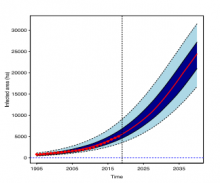Modelling the spread of PCN in Scotland to identify the key factors responsible and the most appropriate management options for future mitigation

Potato Cyst Nematode (PCN) is a threat to the Scottish seed potato and bulb industries: SASA estimates that over 13% of the area regularly planted with potatoes in Scotland is now infested with PCN, with an estimated increase in spread of 5% per year. Recently, following a working group on PCN, a report entitled ‘Potato cyst nematode (PCN) and the future of potato production in Scotland’ was submitted to Scottish Government highlighting the PCN problem in detail and outlining practical recommendations for its reduction. However, in order to maximise and target resources for such a reduction, a better understand is needed of i) the main areas of infestation in Scotland and how this is changing over time, ii) what key factors are responsible for that spread (be it geographic, climatic, agronomic etc) and iii) which management options would allow us to make the biggest impact on reducing spread.
Impact: The outcomes of this project to provide guidance to both policy and industry on the most effective ways to reduce spread of PCN.
Impact: The outcomes of this project to provide guidance to both policy and industry on the most effective ways to reduce spread of PCN.
